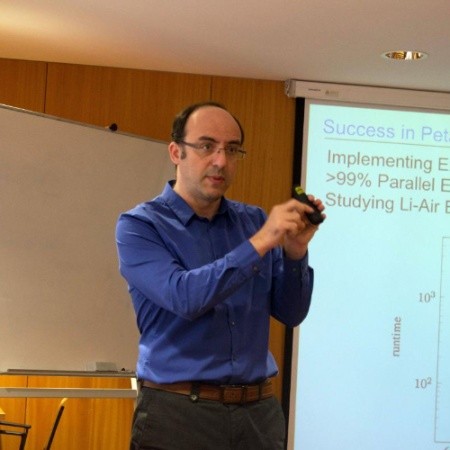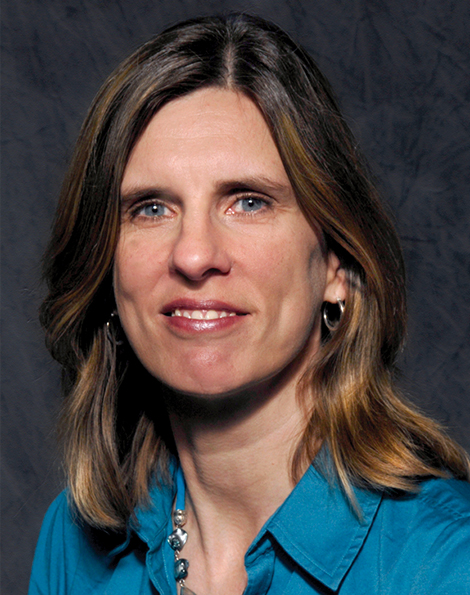
Cognitive Discovery: Accelerating Technical R&D with AI
Author: Costas Bekas
Abstract:
Cognitive Discovery is an overarching framework that uses AI to achieve scientific knowledge extraction and representation, to intelligently design and guide simulations, in order to drastically accelerate the pace of scientific discovery. Cognitive Discovery targets to accelerate scientific workflows in technical disciplines and provide a new generation of tools. The workflows follow the cycle: a) Massive literature review in order to understand the problem at hand. Literature refers to all aspects such as mathematical modelling, solution methods, actual computer models and HPC deployment. b) Enrichment of literature data with experimental data and formation of hypotheses. c) Running simulations to test hypotheses and generate new knowledge in order to close any knowledge gaps. All three phases suffer today major disruptions. Simply put: the volume of new literature is exploding (e.g. roughly 450K new publications in materials science are published every year, tens of thousands of papers in numerical and HPC methods need to be reviewed). IoT advances as well as advances in measuring all aspects of HPC systems create an explosion of data. High fidelity models lead to massive configuration spaces the complexity of which clearly outpaces our capability to scale and efficiently run modern HPC systems. We will showcase how AI can help dramatically improve this setting and lead to a massive acceleration for scientific discovery.
Bio:
Dr. Costas Bekas, Head of Quantitative Development, joined Citadel Securities in Dec. 2019. Prior to that he was a Distinguished Researcher & Manager IBM Research - Zurich, responsible for foundational research in AI spanning areas that include ML/DL, knowledge extraction and representation, new computing paradigms for AI, with applications in Healthcare & Life Sciences, materials discovery and robotics. Costas studied at the pioneering Computer Engineering & Informatics Department of the University of Patras in Greece. He received B. Eng., Msc and PhD diplomas in 1998, 2001 and 2003 respectively with Prof. E. Gallopoulos. In 2003-2005, he worked as a postdoctoral associate with Professor Yousef Saad at the Computer Science & Engineering Department, University of Minnesota, USA. Dr. Bekas’s main focus is in Cogntitive Systems and their impact in industry, science and business. His research agenda spans Machine & Deep Learning, large scale analytics, HPC and very large scale distributed systems. Dr. Bekas is a recipient of the ACM Gordon Bell Prize (2013, 2015), and the PRACE Award (2012).

High Performance is all about Minimizing Data Movement
Author: Mary Hall
Abstract:
Applications running on current and future architectures are mostly performance-limited by the cost of data movement, vertically through the memory hierarchy of a node, and horizontally across nodes. In this talk, we discuss the role of packed data layout in optimizing data movement across a variety of different architectures (CPU and GPU) and memory systems. Conceptually, a high performance application is defined as operations on a unit of data and parallelism that is designed for efficient vertical and horizontal data movement, and can be tailored to match the requirements of an application and target architecture.
Bio:
Mary Hall is a professor in the School of Computing at University of Utah. She received a PhD in Computer Science from Rice University. Her research focus brings together compiler optimizations targeting current and future high-performance architectures on real-world applications. Hall's prior work has developed compiler techniques for exploiting parallelism and locality on a diversity of architectures: automatic parallelization for SMPs, superword-level parallelism for multimedia extensions, processing-in-memory architectures, FPGAs and more recently many-core CPUs and GPUs. Professor Hall is an IEEE Fellow, an ACM Distinguished Scientist and a member of the Computing Research Association Board of Directors. She actively participates in mentoring and outreach programs to encourage the participation of women and underrepresented minorities in computer science.

